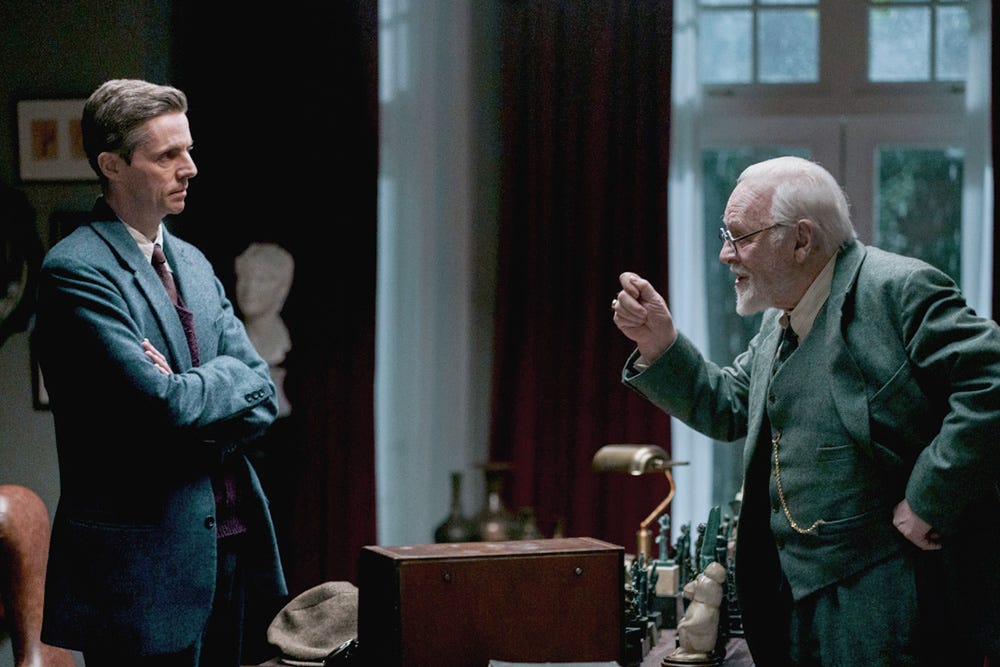Freud's Last Session
Anthony Hopkins gives another mesmerizing performance as Sigmund Freud, during his (wholly conjectured) meeting with author and Christian convert C.S. Lewis.
I’m not sure if actors, like wine, get better with age but some just seem to keep humming right along, delivering one superlative performance after another. Anthony Hopkins is 86 but hasn’t lost anything off his thespian fastball from his heyday of “Silence of the Lambs” and “Remains of the Day.”
In “Freud’s Last Session” he plays the father of psychoanalysis, one of the titans of 20th century intellects. (Or a regressive patriarch who didn’t understand and hated women, depending on who you ask. Former psychology major here.)
The subject is a meeting that in all likelihood didn’t actually happen, between Sigmund Freud and author and Christian apologist C.S. Lewis, best known for his fantasy series “The Chronicles of Narnia.” It’s possible the two corresponded but never met, though filmmaker Matthew Brown wrote and directed this conjectural event based on a book by Mark St. Germain.
Set in September 1939, it’s a tense time in London as war has just broken out between England and Germany; fears of air raids and invasions are all around. People carry their gas masks around with them in little boxes with strings.
Freud has fled his native Austria under the thumb of Nazi persecution, and is suffering from failing health due to oral cancer. (His lifelong phallic obsession with cigars didn’t help.) He takes powerful pain medicine and wears a special dental prosthesis.
Lewis (Matthew Goode) is a professor at Oxford who has just published his first book, “Pilgrim’s Regress,” a fictional rumination upon and response to John Bunyan’s 17th-century Christian allegory, “The Pilgrim’s Progress.” Freud, an ardent atheist, is an admirer of Bunyan’s and has more or less summoned Lewis to his study to be questioned and berated.
He mocks Lewis’ Christianity, which he converted to at age 32 based upon his experiences in World War I and the influence of fellow don/author J.R.R. Tolkien, “a ludicrous dream, an insidious lie.”
Things grow less polite from there.
The movie is essentially just 105 minutes of these two men in suits in Freud’s study, debating theology and humanism. They also talk a lot about their own lives and upbringing, acknowledge their own failures while picking at the other man’s.
“I have only two words to offer to humanity: grow up,” Freud says, just one of many such spiked pronouncements.
The film is mostly a showcase for Hopkins, as the elder and more celebrated actor, but Goode holds his own in portraying a man who is more retiring and accepting of other ideas than is Freud. He makes a funny but cogent point in stating that one reason he believes the Bible isn’t merely mythology is because it’s too inartistic and clumsy to be just fantasy storytelling.
The movie also touches on Freud’s relationship with his daughter, Anna (Liv Lisa Fries), who followed in her father’s footsteps, focusing her work on child psychoanalysis. Freud keeps her under his thumb, treating her as a child herself and sometimes more like a servant. Her romance with another colleague, Dorothy Burlingham (Jodi Balfour), is something she keeps hidden from her father.
“Freud’s Last Session” is a tidy little piece of storytelling, even if almost everything it depicts is a lie. It’s the sort of momentous meeting between two giants of history that would be really interesting to observe, if it ever happened.



